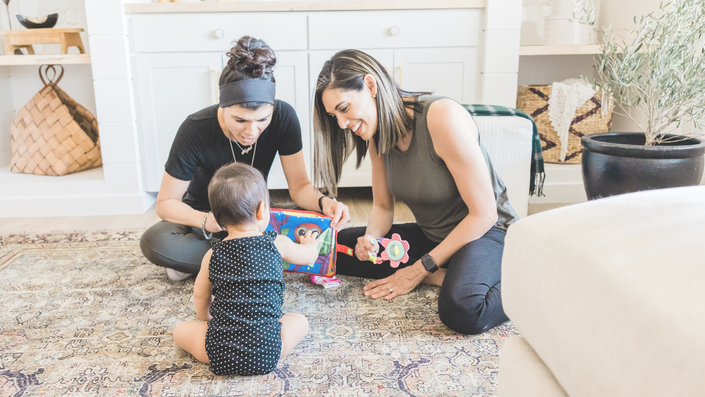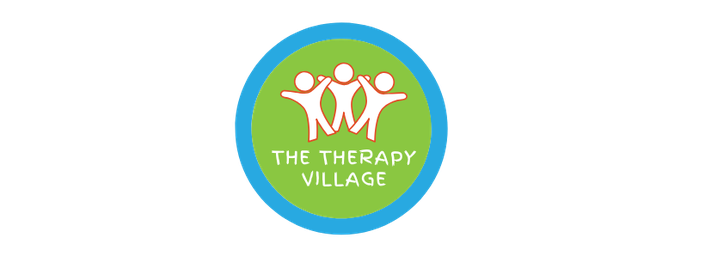Congratulations! You're in the right place if:
✅You're and Occupational Therapist or Assistant and you've recently started your first Early Intervention position and there's limited or no mentorship.
✅You're a new grad and want to land a job in Early Intervention.
✅ You're feeling overwhelmed about how to conduct effective therapy sessions.
✅You're passionate about making a difference in the lives of young children and their families.
✅ You dream of building strong connections, enjoying confidence in your practice, and avoiding burnout and overwhelm.


The Power of Mentorship
Early Intervention Occupational Therapy Professionals often face unique challenges. Balancing the needs of young children, concerned families, and the demands of a dynamic field can be overwhelming. Burnout and self-doubt are common hurdles.
But guess what?
You don't have to navigate this journey alone.
Mentorship is the key to unlocking your full potential as an Early Intervention OTP. Imagine having a seasoned professional by your side, guiding you through the intricacies of your practice, sharing wisdom, and providing the tools you need to flourish.
What Can You Achieve with Group Mentorship?
🌟 Confidence: Gain the self-assurance you need to make decisions confidently. Strengthen your clinical reasoning and knowledge base.
🌟 Impactful Practice: Transform your therapy sessions into powerful experiences for both children and their families. Achieve those IFSP outcomes more consistently!
🌟 Prevent Burnout: Learn proven strategies to manage stress, prevent burnout, and maintain a healthy work-life balance.
🌟 Effective Communication: Master the art of communication and collaboration with families, caregivers, and other healthcare professionals.
🌟 Holistic Development: Early Intervention is not just about the child, but the entire family unit. Enhance your knowledge on evidenced-based practices across developmental domains.
🌟 Personal Growth: Develop as a professional and as an individual. Set and achieve your career goals with purpose and intention.
The Details
6 weeks of pre-recorded lessons
We will cover a variety of topics over the 6 weeks. My goal will be to give you just enough information and keep the focus on the application so you'll know exactly where to start when your out there in the field. You'll need to set aside approximately 60 minutes each week to listen at your convenience. New lessons will be released each Friday and you'll have until the following Friday before our group call to listen.

Weekly Group Coaching Calls (7 live calls)
These will take place on Zoom weekly for 1 hour. It's preferred that you attend these calls live so you get the benefit of deepening your understanding of the content as well as get your questions answered. Live calls are your time to practice what you're learning and apply it to your caseload. Also, when you attend live you will be eligible for CEUs. Start each new week at work feeling confident and inspired. You'll also get the benefit of connecting with your peers. and yes...they will be recorded (cause I get that life happens!)

A library of parent handouts and therapist resources
Each lesson will have a variety of parent handouts that will be yours to keep forever. Print these for families and take them to your sessions so you'll never be at a loss for words. You can also download them and send electronically to your families. These will save you so much time so you can focus on other things (like your own self-care!). There is also a library of therapist resources for each lesson to deepen your knowledge base even further before, during, or after the 6 weeks.

A sample of our lessons
- Zoom Call Invitation
- Zoom Call-1/19/24-Meet and Greet (49:32)
- Zoom Call-1/26/24-Parent Coaching/Setting the Stage (50:27)
- Zoom Call-2/1/24-The first session/caregiver interview (78:45)
- Zoom Call-2/8/24-Routines-based treatment (54:37)
- Zoom Call-2/16/24-Sensory (84:09)
- Zoom Call-2/23/24-Feeding (71:37)
- Week 1 Slides
- Week 1 Parent handouts
- Lesson 1.1: Why coach? (6:15)
- VIDEO: NYC Health: Early Intervention: Family-Centered Best Practices
- Lesson 1.2: Mindset shift from therapist to coach (11:19)
- VIDEO: VEIPD: Early Intervention Part 3: Changing the Mindset
- Lesson 1.3: Setting the stage (12:46)
- VIDEO: Explaining OT to a family
- VIDEO: Explaining coaching to a family
- Lesson 1.4: Tips for building a relationship with families (12:08)
- Week 1 Summary
- Please complete Week 1 Feedback Form...Thank you!
- Week 1 Quiz
- Week 3 Slides
- Therapist/Parent Handouts
- Lesson 3.1: Adult learning principles (11:14)
- Lesson 3.2: Coaching step #3-Helping families take action (6:20)
- Lesson 3.3: Coaching steps #4 &5: Feedback and Reflection (10:37)
- Lesson 3.4: Video sample of coaching session
- Lesson 3.5 Coaching step #1&6-Joint Planning (9:47)
- Week 3 Summary
- Week 3 Feedback form
- Week 3 Quiz
- Case Study Questions
- Week 4 slides
- Therapist/Parent handouts
- Lesson 4.1: Explaining sensory to families (13:30)
- Lesson 4.2: Assessment (13:48)
- Lesson 4.3: Building sensory into routines (13:13)
- Lesson 4.4: Video: Coaching during dysregulation
- Week 4 Summary
- Week 4 Feedback Form
- Week 4 Quiz
- Case Study: Sensory-Y.G.
- Please complete: Case Study Form
- Week 5 Slides
- Parent handouts/Therapist Resources
- Lesson 5.1: Why children don't eat (13:22)
- Lesson 5.2: Feeding history and when to refer (7:49)
- Lesson 5.3: Feeding Case Introduction (1:42)
- Feeding Observation Video Example
- Lesson 5.4: Coaching parents during mealtime (11:18)
- Lesson 5.5: Helping parents with food selection (15:34)
- Week 5 Summary
- Week 5 Feedback form
- Week 5 Quiz


Why Mentorship with me?
My OT story
In 1995, I embarked on my official journey as an Occupational Therapist. However, even before starting OT school, I knew I wanted to work with young children. It was a calling I couldn't ignore, a passion that spoke to me from the time I was little (even though I had no idea what OT was back then). I had the privilege of shadowing a young OT working in EI when I was just 14 and I went home that day and told my parents I was gonna be an OT when I grew up! (That was over 30 years ago and I'm still waiting to grow up 🤪).
My first OT job provided me with the opportunity I had dreamed of: working with young children. Yet, I quickly found myself feeling like a fish out of water, overwhelmed, and disheartened. In hindsight, I believe the root of my struggle lay in the training I had received (and also the training I didn't receive 😧). My OT school had focused heavily on a deficit-based treatment model, and I entered my first job believing that I needed to fix every child I encountered.
This misconception led me on a wild goose chase, believing that I had to possess all the answers to every problem a child or parent faced. The relentless pursuit of knowledge, often through costly continuing education courses, became my norm. It was a path fueled by self-doubt and the fear of failing the children and families who depended on me. It also led me to feel isolated, burnout, and the pull to be around more experienced practitioners to learn from.
Thankfully, this opportunity came a few years into my career when I became employed at a local hospital to work on a pediatric brain injury unit. There, I was surrounded by experienced professionals who had weathered the challenges I was now facing. I realized that I didn't have to bear the weight of the world on my shoulders. Instead, I could rely on the wisdom and support of those who had walked this path before me.
This shift in perspective was transformative. It marked the beginning of a journey to rediscover my passion for Occupational Therapy with renewed confidence and purpose. It taught me that it's okay not to have all the answers, and that true impact is often achieved through collaboration, not isolation.
It wasn't until many years later, I experienced a pull back to Early Intervention after the birth of my first son. He was born premature and required some Early Intervention support his first few years. I also accepted an Early Intervention position around the same time at an agency that was pioneering the way towards a coaching model of practice. In addition, I was able to be a part of an in-house transdisciplinary team that met weekly to discuss our caseloads. I cannot express enough how crucial this position and team were in my growth and resilience within this complex field. After 20 years, I was finally starting to feel proficient and effective.
I share my story with you in hopes that it will inspire you to not give up on your "why you became an OT" vision. It's my mission now to use my 23 years in the field to help guide you through those pitfalls and challenges, and to help you avoid burnout while making a profound impact on the lives of young children and their families in much less time than it took me. My mentorship isn't just about clinical skills; it's about empowerment, resilience, and a career that leaves you fulfilled and confident. After all...isn't that why you entered this field?
Join me on this journey, and together, we'll ensure you thrive in your Early Intervention Occupational Therapy practice, just as I have learned to do.
We are better together!
My promise to you:




"Taking a course is like learning to sail from a book, but having a mentor by your side is like having a seasoned captain who not only teaches you the ropes but helps you navigate the open waters, ensuring that you reach your destination safely and with confidence"
-Unknown Author
It's my mission to help you transform from an overwhelmed newbie to a confident practitioner who is ready to step into your clients' lives knowing where and how to start making an impact.
The choice is now yours. Becoming a confident therapist doesn't happen overnight but having validation that you're on the right track and support from an experienced OT who has walked in your shoes will lessen your overwhelm and help you to become more impactful in your practice.
I know you've already spent countless dollars on your education but investing in mentorship will allow you to apply that education on a deeper level in a shorter timeframe and will ensure that all your hardwork so far translates to the outcomes you desire.
The next group starts in Spring 2024. The group size will be limited (no more than 8 participants). Join the waitlist below by subscribing to the Growing Little Brains VIP list). Weekly feedback will be expected from all participants in order to meet the learning needs of this and future groups.
I'm excited to be a part of your OT journey and look forward to meeting you soon!
Hear what past participants have to say:








